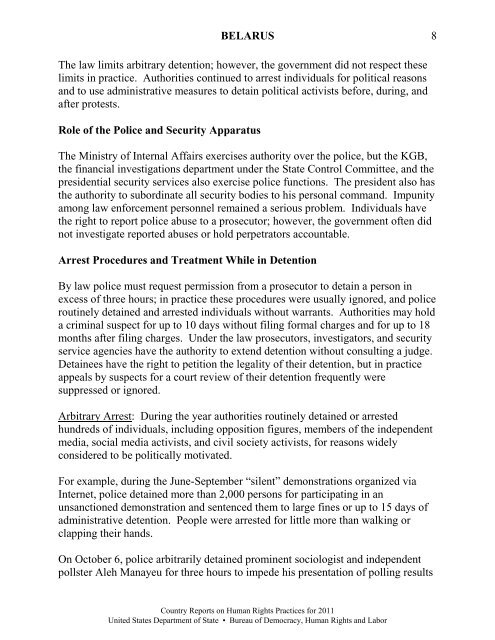belarus executive summary - US Department of State
belarus executive summary - US Department of State
belarus executive summary - US Department of State
Create successful ePaper yourself
Turn your PDF publications into a flip-book with our unique Google optimized e-Paper software.
BELAR<strong>US</strong> 8<br />
The law limits arbitrary detention; however, the government did not respect these<br />
limits in practice. Authorities continued to arrest individuals for political reasons<br />
and to use administrative measures to detain political activists before, during, and<br />
after protests.<br />
Role <strong>of</strong> the Police and Security Apparatus<br />
The Ministry <strong>of</strong> Internal Affairs exercises authority over the police, but the KGB,<br />
the financial investigations department under the <strong>State</strong> Control Committee, and the<br />
presidential security services also exercise police functions. The president also has<br />
the authority to subordinate all security bodies to his personal command. Impunity<br />
among law enforcement personnel remained a serious problem. Individuals have<br />
the right to report police abuse to a prosecutor; however, the government <strong>of</strong>ten did<br />
not investigate reported abuses or hold perpetrators accountable.<br />
Arrest Procedures and Treatment While in Detention<br />
By law police must request permission from a prosecutor to detain a person in<br />
excess <strong>of</strong> three hours; in practice these procedures were usually ignored, and police<br />
routinely detained and arrested individuals without warrants. Authorities may hold<br />
a criminal suspect for up to 10 days without filing formal charges and for up to 18<br />
months after filing charges. Under the law prosecutors, investigators, and security<br />
service agencies have the authority to extend detention without consulting a judge.<br />
Detainees have the right to petition the legality <strong>of</strong> their detention, but in practice<br />
appeals by suspects for a court review <strong>of</strong> their detention frequently were<br />
suppressed or ignored.<br />
Arbitrary Arrest: During the year authorities routinely detained or arrested<br />
hundreds <strong>of</strong> individuals, including opposition figures, members <strong>of</strong> the independent<br />
media, social media activists, and civil society activists, for reasons widely<br />
considered to be politically motivated.<br />
For example, during the June-September “silent” demonstrations organized via<br />
Internet, police detained more than 2,000 persons for participating in an<br />
unsanctioned demonstration and sentenced them to large fines or up to 15 days <strong>of</strong><br />
administrative detention. People were arrested for little more than walking or<br />
clapping their hands.<br />
On October 6, police arbitrarily detained prominent sociologist and independent<br />
pollster Aleh Manayeu for three hours to impede his presentation <strong>of</strong> polling results<br />
Country Reports on Human Rights Practices for 2011<br />
United <strong>State</strong>s <strong>Department</strong> <strong>of</strong> <strong>State</strong> • Bureau <strong>of</strong> Democracy, Human Rights and Labor
















